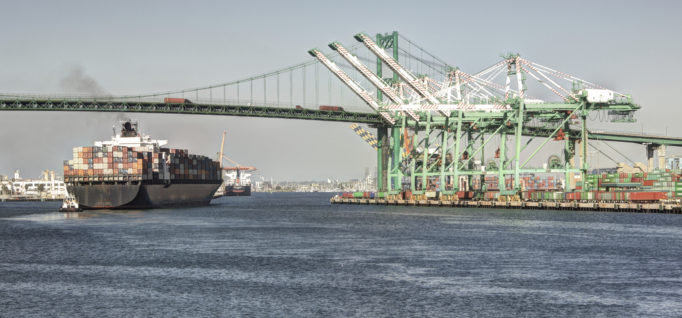California Colleges Build Trade-Related Workforce
By Teri Cettina
May 16, 2016
Community colleges in the Los Angeles area have joined forces to offer programs that enhance students’ work skills for global trade.
Seven Los Angeles and Orange County, California, community colleges recently joined forces to better prepare their students for jobs in the international trade-related workforce.
Through the Global Trade & Logistics Consortia (PRO-GTL), college faculty members, working closely with local business and civic leaders, are creating new courses and certificate programs for students interested in jobs in supply-chain management and logistics. These are the workforce sectors responsible for efficiently transferring products between businesses throughout the world, and they represent a wealth of jobs in the Los Angeles area.
According to the California Economic Summit, 600,000 California jobs are related to the seaports, the airports and the border with Mexico, and an additional 1.5 million jobs are connected to the movement of goods.
Consortia participants include East Los Angeles College, Los Angeles Harbor College, Los Angeles Mission College, Los Angeles Southwest College, Santa Ana College, Santa Monica College and West Los Angeles College, as well as the nonprofit Community Career Development Inc.
Why the focus on logistics and trade?
“Southern California is an international hub for global trade,” says Rick Hodge, PRO-GTL co-director and dean of career technical education and workforce development at Los Angeles Southwest College. “When combined, the ports of Los Angeles and nearby Long Beach create the nation’s largest port, plus we have L.A. International Airport moving goods in and out of the area.” According to Hodge, the Los Angeles area is responsible for more global trade-related jobs than anywhere else in the country, including New York.
In addition, companies like UPS, FedEx and Office Depot have large facilities in the Los Angeles area, and Amazon runs a major distribution center in nearby Rancho Cucamonga. “These companies offer a lot of ‘middle-scale’ jobs that pay very well and don’t require bachelor’s degrees — just certificates in trade-related skills like logistics, global management, global marketing, communications and more,” Hodge says.
The challenge for these companies is hiring work-ready employees. Technology improvements mean that the skills required for international trade jobs are changing quickly and constantly. That’s where PRO-GTL comes in.
What PRO-GTL is doing
For the past year, PRO-GTL college representatives have met bimonthly with the GTL Regional Advisory Board, which helps the colleges identify which trade-related skills and certificate programs are most needed in the global marketplace. The advisory board includes 25 representatives from organizations such as UPS, Office Depot, the Tesla Foundation, the Council of Supply Chain Management, the U.S. Department of Commerce and the Port of Los Angeles.
“If we can tailor our programs to these employers’ needs, our students can graduate into entry-level jobs that pay really well — an average of $25,000 to $49,000 per year,” Hodge says. “However, we also have to educate students that these jobs — which are not high-profile and ‘glossy’ — are available to them.”
To that end, the consortia has sponsored an informal coffeehouse series on two campuses so far. Faculty members invite students and entire classes to hear global-trade-related employees talk about their work. The consortia also sponsors an annual GTL Summit that includes exhibits by hiring employers, a showcase of PRO-GTL-sponsored projects, workshops for faculty and more.
Collaboration over competition
The consortia colleges have learned that they are more effective when they work together rather than individually. “That’s really the direction California community colleges are going,” Hodge says. “We are becoming much more about collaboration than competition.”
On a practical level, this has resulted in each consortia college creating one or two new specialty programs related to the global trade and logistics industry. For instance, Los Angeles Southwest College has created programs in global management; West Los Angeles College is specializing in global studies, which draw students interested in international marketing, communications and customer service; and Santa Ana College is focusing on programs in entrepreneurship and innovation.
PRO-GTL is financed through a grant from the state’s Career Technical Education (CTE) Enhancement Fund, which was created to help California community colleges develop and expand CTE education that responds to regional labor-market needs.






